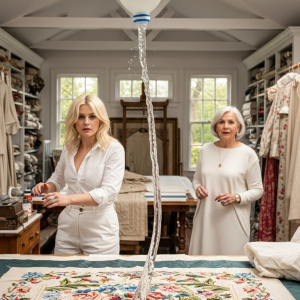The top floor of Sterling Enterprises was a world of brushed steel, polished glass, and a silence so profound it seemed to have its own weight. It was here, long after the last employee had departed, that Anna Sterling did her real work. Bathed in the blue glow of a monitor, she was a ghost in the corporate machine, the architect of its successes, yet invisible to all but a few.
Tonight, her focus was a set of files marked with a digital scar: “Project Nightingale: European Expansion – Archived/Failed.” It was a ghost of its own, a year-old catastrophe that had cost the company millions. And it was now her secret obsession, her crucible.
Anna was a woman forged in diligence. She had joined the company not as the wife of the owner’s son, but as a junior analyst, working her way up through sheer competence. She understood supply chains, market analytics, and consumer behavior with an intimacy that was both a gift and a burden. She saw the company not as a legacy to be inherited, but as a complex organism that needed constant, careful nurturing.
Miles away, in a ridiculously expensive restaurant where the water was imported from a Fijian volcano, Brenda Sterling was also working. Her phone was pressed to her ear, her voice sharp and imperious as she spoke to her wedding planner.
“No, I said peonies, not roses. Peonies flown in from Holland. Is that so difficult to understand? And the caterer needs to understand that ‘suggested pairings’ are not suggestions, they are commands.” Brenda, daughter of the founder, fiancée of a man whose only discernible skill was wearing a blazer, treated the world as her personal concierge service.
She viewed Sterling Enterprises in much the same way: a vast, glittering bank account established for her sole benefit. Her official title was Vice President of Brand Outreach, a position that involved approving champagne for launch parties and taking long lunches. Her greatest professional achievement to date was the spectacular failure of Project Nightingale.
She had swept into London a year ago, armed with a limitless expense account and a plan to launch Sterling’s luxury goods into the European market. She hosted galas, hired influencers, and redesigned the London office to look like a Milanese nightclub. She had focused entirely on the sparkle, ignoring the tedious bedrock of logistics, distribution, and local market regulations. The project imploded within six months, a financial black hole that was quietly written off. Brenda, with the unshakeable confidence of the truly entitled, blamed “an unpredictable European market” and “a distinct lack of vision from the local teams.” The subject was then, by unspoken family decree, closed.
But her father, Henry Sterling, had not forgotten. A man who had built an empire from a single workshop, he was a shrewd judge of character, though his love for his daughter had long been a blinding indulgence. Recently, however, a change had occurred. He had begun to summon Anna to his office for quiet, closed-door meetings, entrusting her with sensitive projects that bypassed the usual chain of command. He would watch her, his face a mask of careful neutrality, as she presented her findings.
Brenda noticed. The shift in her father’s attention from the spotlight of her presence to the shadow of Anna’s work was an offense she could not tolerate. It sparked a new, venomous strain of resentment in her. And she, in her own way, began planning a counter-offensive.
The relationship between Anna and Mark, Henry’s son, was the quiet, sturdy heart of the family. Mark had none of his sister’s arrogance. He was an engineer by training, the head of product development, a man who appreciated things that were well-made and people who were genuine. He had seen Anna’s brilliance from the day she arrived and had fallen for her mind long before he fell for her heart.
He often found her in their home office late at night, surrounded by spreadsheets and projections, a frown of concentration on her face. Tonight was one of those nights. He came in with two mugs of tea, placing one beside her laptop.
“Still wrestling with the dragon?” he asked softly, massaging her tense shoulders.
Anna sighed, leaning back into his touch. “It’s not a dragon, Mark. It’s a hydra. I solve one distribution problem in Germany, and two customs issues pop up in France. Brenda’s initial strategy wasn’t just flawed; it was actively destructive. She signed exclusive transport contracts that were routed through the most expensive and inefficient hubs imaginable. It’s like she was trying to set money on fire.”
Mark’s jaw tightened. “Don’t I know it. I saw the reports. She nearly bankrupted the London office to impress a few vapid socialites. The worst part is, she learned nothing from it. To her, it was just a failed party.” He looked at his wife, his expression a mixture of pride and concern. “Dad is putting a lot on you with this, Anna. It’s not fair that you have to be the one to clean up her mess.”
“He didn’t ask me to clean it up,” Anna corrected him gently, a determined glint in her eye. “He asked for an assessment of the potential for revival. He wants to know if there’s a spark of life left in the ashes. I think there is. I think… I think I know how to make it work.”
Her quiet confidence was one of the things he loved most about her. While Brenda demanded respect, Anna earned it. While Brenda postured and performed, Anna built and delivered. He knew his father saw it too. The old lion was nearing the end of his reign, and he was watching, testing, and waiting. Mark just hoped that when the time for decision came, his father’s courage would not fail him.
Thanksgiving at the Sterling estate was a masterclass in passive aggression. The table was laden with a feast prepared by a private chef, the crystal glasses shimmered under the light of a chandelier the size of a small car, and the conversation was meticulously superficial.
Brenda, naturally, was the star of the show. She regaled the family with breathless updates on her wedding plans, each detail more extravagant than the last. Her fiancé, Chad, a handsome man with the vacant smile of a department store mannequin, nodded along, offering contributions like, “The valet service will be top-notch.”
Anna and Mark did their best to remain engaged, while Henry presided over the head of the table with the quiet, watchful stillness of a predator. He asked Mark about a new product prototype and complimented Anna on a recent efficiency report, small gestures that nonetheless caused Brenda to narrow her eyes.
The moment the pumpkin pie was cleared, Brenda clapped her hands together with theatrical flair. “Well, now that dinner is done, I have a little something to present. A bit of family business.”
From a large, designer tote bag, she produced a dozen thick, professionally bound documents, the cover emblazoned with gold foil: “The Sterling-Vance Nuptials: A Brand Synergy Proposal.” She slid one to each family member.
Anna opened hers. Inside was a dizzying, fifty-page document detailing a wedding with a budget that approached half a million dollars. It included sections on “media outreach,” “influencer engagement,” and “synergistic brand placement.” It was a corporate takeover disguised as a wedding plan.
Brenda stood, adopting the posture of a CEO addressing her shareholders. “As you can see, this is more than just a wedding. This is a premier social event. The guest list includes tastemakers, industry leaders, and media personalities. By branding the event as ‘A Sterling Affair,’ the company will receive invaluable press and brand reinforcement.”
She finally got to the point. “Therefore, I am formally requesting that the company’s marketing and events budget absorb the costs outlined within. It is, after all, a strategic investment in the family name.”
A stunned, uncomfortable silence descended upon the dining room. Mark looked like he wanted the floor to swallow him whole. His mother began nervously rearranging the silverware. Brenda, however, looked only at her father, her face beaming with the absolute certainty of a daughter who had never been told no.
Henry Sterling picked up the glossy proposal. He slowly, deliberately, put on his reading glasses. He turned the pages, his face an unreadable mask of stone. The silence stretched, becoming taut and heavy. Brenda’s confident smile began to waver, replaced by a flicker of impatient anxiety.
He spent what felt like an eternity studying a page that detailed the cost of releasing two dozen doves at the end of the ceremony. He then closed the book with a soft, definitive thud. He removed his glasses, polished them with a silk handkerchief, and placed them back in his pocket.
He looked at his daughter, his eyes holding hers for a long, heavy moment. Then his gaze shifted, moving with unnerving calm across the table to land on Anna, who sat poised and still, her hands resting in her lap. He looked back at Brenda.
“You’re right about one thing, Brenda,” he said, his voice quiet but resonating with an authority that commanded the room’s absolute attention. “This is a business proposal. And it deserves to be considered in a business context.”
Brenda’s smile returned, brighter than before. She thought she had won.
“So,” Henry continued, his voice as sharp and cold as ice, “let’s talk about business. Let’s talk about real investments and real returns.”
He did not look at Brenda again. His entire focus was now on his daughter-in-law.
“Before we discuss funding your future, Brenda, I think it’s only fair that we first review the results of an investment we’ve already made. Anna,” he said, his voice softening ever so slightly, “I believe you have an update for us on Project Nightingale.”
The blood drained from Brenda’s face. “Project Nightingale? That’s… that’s a dead project. It failed.”
“Is it?” Henry’s eyebrows raised. “That’s not what I’ve been hearing. Anna, if you would. Mark, help your wife with the projector.”
Anna, calm and prepared, gave a small nod. She had suspected this moment might come. Her laptop was in her bag, the presentation ready. As Mark connected the cable to the large television screen in the dining room, the atmosphere crackled with a tension so thick you could taste it. Brenda stared, her mouth slightly agape, a look of dawning horror on her face as she realized this was not an agenda she had written. This was a public ambush.
The television screen flickered to life, displaying the clean, professional title slide: “Project Nightingale 2.0: European Market Revival Strategy & Q4 Results.”
Anna stood, and a transformation occurred. The quiet, observant daughter-in-law disappeared, replaced by a confident, commanding executive. Her voice was clear and steady as she began to speak, not to the family, but as if to a board of directors.
“The initial approach to the European expansion failed for two primary reasons,” she began, her tone analytical and devoid of accusation. “An over-leveraged investment in high-cost, low-impact marketing, and a fundamental misunderstanding of the European distribution network.”
She clicked to the next slide, which showed a complex logistical map, riddled with red lines indicating Brenda’s inefficient routes. “We were paying premium rates to ship product through convoluted channels, leading to delays, spoilage, and, ultimately, an inability to meet retailer demand, even where it existed.”
Brenda sank lower in her chair, her face a pale mask of disbelief and humiliation. This wasn’t just a presentation; it was a clinical, systematic dissection of her failure.
Anna continued, her voice gaining momentum. “My first step was to dissolve those contracts—which cost us a one-time penalty, but saved us millions in the long run—and to establish new partnerships with regional distribution hubs in Hamburg and Lyon. This immediately cut our shipping costs by sixty percent and our delivery times by seventy-two hours.”
She moved through the slides with practiced ease, detailing her targeted digital marketing strategy that focused on real customer engagement rather than paying for vapid influencers. She showed charts displaying a steady, then rocketing, increase in sales, market penetration in key demographics, and positive retailer feedback.
She had not just salvaged the project; she had rebuilt it from the foundation up, turning every one of Brenda’s weaknesses into a strength. She had done it quietly, diligently, and with devastating effectiveness.
Finally, she arrived at the last slide. It was simple, containing only a few lines of text against a Sterling Enterprises blue background.
“Based on the successful Q4 relaunch and secured contracts for the next fiscal year,” Anna concluded, her voice ringing with quiet triumph, “Project Nightingale is now forecast to generate a net profit of ten million dollars over the next three years, with a projected growth of fifteen percent year-over-year thereafter.”
She turned from the screen to face the family. The room was utterly silent. Brenda looked as if she had been physically struck, her glossy wedding proposal lying forgotten beside her plate. Anna had taken her greatest failure and turned it into a monumental success.
Henry Sterling let the final slide hang in the air for a full minute, allowing the weight of the number—$10,000,000—to settle in the room. He then stood up, his posture ramrod straight, the undisputed patriarch of his kingdom.
He looked first at his daughter, his expression not of anger, but of a deep, profound disappointment.
“Brenda, your proposal asks this company to spend half a million dollars to fund your future. A future of parties and social status.”
He then turned his gaze, now filled with an immense, undisguised pride, to Anna.
“Anna, with her work, has just funded the future of this company for the next decade. She invested her talent and her effort, and she has delivered a return beyond any of our expectations.”
He walked to the head of the table, standing between the two women. His voice, when he spoke again, was the sound of a final judgment being rendered.
“The answer to your request, Brenda, is no. Sterling Enterprises will not be funding your wedding.”
He paused, letting the words land with the force of a gavel. But he was not finished.
“And since we are on the subject of the company’s future… it has become clear to me that a change in leadership is required. A change that favors vision over vanity, and results over reputation.” He took a deep breath. “I am therefore honored and delighted to announce that, effective at the end of this fiscal year, the new Chief Executive Officer of Sterling Enterprises will be Anna Sterling.”
The sound of Brenda’s wedding proposal binder sliding from the table and hitting the Persian rug with a dull thud was the only sound in the room. It was the sound of an era ending. Then, Mark was on his feet, beaming, and wrapped his wife in a fierce hug. His mother, after a moment of shock, began to applaud softly. Other family members, sensing the irreversible shift in power, joined in.
Brenda sat frozen, a silent, screaming statue of obsolescence, watching as her entire world was dismantled and handed to the one person she had always dismissed. Anna, surrounded by the family that was finally, truly hers, stood tall, not with arrogance, but with the quiet, unshakeable strength of a woman who knew she had earned her place.
The transition was as swift as it was brutal. The company announcement, sent out the following Monday, was met with a wave of relief and quiet celebration among the employees. They had long suffered under Brenda’s whimsical and often tyrannical reign as the heir apparent. Anna’s appointment signaled a return to sanity, to meritocracy.
Anna stepped into the role of CEO with a grace and efficiency that surprised no one who had actually worked with her. Her first act was not a grand, sweeping change, but a series of quiet, intelligent ones. She streamlined communication between departments, promoted talented managers who had been overlooked for years, and implemented a transparent bonus structure based on performance, not on favor. She commanded respect not by raising her voice, but by the undeniable logic of her decisions.
Brenda, meanwhile, retreated. She and Chad did get married, not in a half-million-dollar spectacle, but in a much smaller, more subdued ceremony at her mother’s country club, paid for by a loan from her mother’s personal trust. The society pages barely mentioned it. Her father’s public rejection and replacement of her had rendered her socially irrelevant, a fate she considered worse than death. She no longer held a position at the company, instead receiving a modest allowance from a family trust, contingent upon her non-interference in business affairs.
Mark was his wife’s biggest champion. He thrived under her leadership, freed from the awkward position of having to apologize for his sister’s incompetence. Their partnership, always strong, was now a formidable alliance, both at home and in the boardroom.
The final image of Anna’s victory was not one of gloating, but of quiet command. Six months into her tenure, she sat at the head of the long, polished table in the Sterling Enterprises boardroom. Her father, now Chairman Emeritus, sat to her right, observing with a look of deep satisfaction. Mark sat to her left, her partner in every sense of the word.
She was presenting the first quarterly report under her leadership. The numbers on the screen behind her were strong, the projections even stronger. She spoke with clarity and vision, outlining her plans for sustainable growth and innovation. She had proven her worth not through birthright or through marriage, but through the undeniable power of her own competence. She had not just been given a seat at the table; she had rebuilt the table itself, and it was now rightfully, indisputably, hers.




